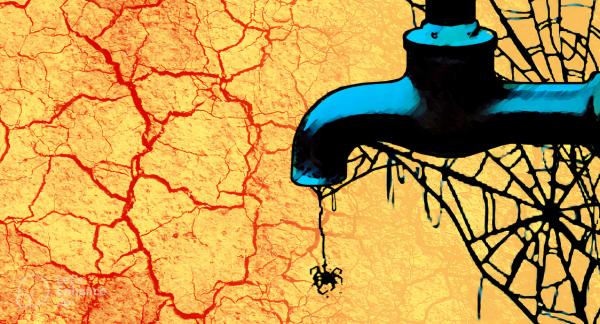Water Security: Issues and challenges for India
By Neeraj Singh Manhas, Director of Research in the Indo-Pacific Consortium at Raisina House, New Delhi
22 Feb 2023 by The Water Diplomat

Water security in India refers to the availability of adequate and clean water resources to meet the country's growing water demand, while ensuring the sustainability of the water ecosystems. This is in line with the definition of water security provided by UN Water, which is a United Nations inter-agency coordination mechanism on all freshwater-related issues. It involves ensuring access to safe drinking water, managing water resources effectively, and reducing the risk of water-borne diseases. In India, water security is a major challenge due to over-extraction of groundwater, water pollution, and unequal distribution of water resources. Addressing water security is critical for the country's economic and social development, as well as the health and well-being of its citizens.
Concept of Traditional and Non-Traditional Threat
Water security has been recognized as a critical issue within government policy circles and among various stakeholders such as civil society organizations, academics, and researchers. The growing recognition of water as a finite and valuable resource, coupled with the increasing risks and impacts of water-related issues, has led to water security being perceived as a threat to India's development and sustainability. Therefore, various measures have been taken to address the challenges related to water security in India, including the implementation of policies, programs, and initiatives aimed at improving water management, conservation, and governance.
Traditionally, water security was seen as a technical issue of water supply and management, with a focus on meeting water demand through infrastructure development. However, it has now expanded to encompass a broader range of social, economic, and environmental factors, including water quality, water allocation, and water governance.
In India, water security has been recognized as a non-traditional threat due to the interlinkages between water and other critical sectors such as agriculture, energy, health, and the environment. The country faces a range of water-related challenges, including water scarcity, water pollution, floods, and droughts, which have significant impacts on various aspects of society and the economy.
The concept of non-traditional threat recognises water security as a complex and interconnected issue that requires a holistic and integrated approach, involving multiple stakeholders and a range of policies and practices. This approach recognises the need for better water governance, enhanced water management practices, and increased investment in water infrastructure and technology.
Source: Next IAS
Issues and Challenges
Water security in India faces several issues and challenges that threaten the sustainability and development of the country. These include over-extraction of groundwater, water pollution, inadequate distribution, lack of proper water management, climate change, and conflicts over water. India relies heavily on groundwater, which is being depleted at an alarming rate due to over-extraction for irrigation, industrial, and domestic use. The increasing industrialization and urbanization has led to widespread water pollution, contaminating rivers and groundwater, and making it unsafe for consumption. There is unequal distribution of water resources across the country, with some regions facing severe water scarcity while others have surplus water. India lacks proper water management systems, with inefficient irrigation systems, leaky water supply networks, and insufficient wastewater treatment facilities. Climate change has resulted in irregular monsoon patterns and increased frequency of natural disasters, causing further strain on India's water resources. With increasing water scarcity, there are growing conflicts between different states, communities, and sectors over the distribution and use of water. Addressing these challenges is crucial for ensuring water security in India and sustainable development of the country.
Way Forward
Improving India's water security will require a combination of policy, technology, and behavioral solutions. One essential strategy is to enhance water governance systems, with clear policies, laws, and institutions to manage and allocate water resources effectively and equitably. Efficient water management practices like rainwater harvesting, conservation, and recharge should be adopted to reduce water waste and increase availability.
The country needs to invest in water infrastructure such as dams, reservoirs, and canals, to improve water storage capacity, distribution, and mitigate the impacts of water-related disasters. Promoting the adoption of water-saving technologies like drip irrigation, micro-irrigation, and water-efficient appliances can significantly reduce water consumption and improve productivity. Additionally, the government should implement and enforce regulations to prevent water pollution and ensure access to safe drinking water, especially in rural and urban areas. Changing behavior is also critical, such as reducing water usage, avoiding water waste, and improving water hygiene practices. Collaboration and active engagement of various stakeholders including the government, civil society, private sector, and communities are essential to addressing these challenges.
Addressing these challenges requires a collaborative and multi-stakeholder approach, with the active engagement of government, civil society, private sector, and communities. Investing in water security will not only improve water availability and quality, but will also contribute to the overall economic and social development of India.
